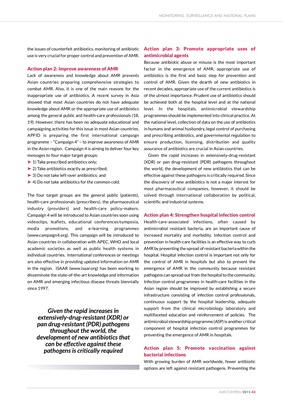
the issues of counterfeit antibiotics, monitoring of antibiotic
use is very crucial for proper control and prevention of AMR.
Action plan 2: Improve awareness of AMR
Lack of awareness and knowledge about AMR prevents
Asian countries preparing comprehensive strategies to
combat AMR. Also, it is one of the main reasons for the
inappropriate use of antibiotics. A recent survey in Asia
showed that most Asian countries do not have adequate
knowledge about AMR or the appropriate use of antibiotics
among the general public and health-care professionals (18,
19). However, there has been no adequate educational and
campaigning activities for this issue in most Asian countries.
APFID is preparing the first international campaign
programme - "Campaign 4" - to improve awareness of AMR
in the Asian region. Campaign 4 is aiming to deliver four key
messages to four major target groups:
‰ 1) Take prescribed antibiotics only;
‰ 2) Take antibiotics exactly as prescribed;
‰ 3) Do not take left-over antibiotics; and
‰ 4) Do not take antibiotics for the common cold.
The four target groups are the general public (patients),
health-care professionals (prescribers), the pharmaceutical
industry (providers) and health-care policy-makers.
Campaign 4 will be introduced to Asian countries soon using
videoclips, leaflets, educational conferences/symposia,
media promotions, and e-learning programmes
(www.campaign4.org). This campaign will be introduced to
Asian countries in collaboration with APEC, WHO and local
academic societies as well as public health systems in
individual countries. International conferences or meetings
are also effective in providing updated information on AMR
in the region. ISAAR (www.isaar.org) has been working to
disseminate the state-of-the-art knowledge and information
on AMR and emerging infectious disease threats biennially
since 1997.
Action plan 3: Promote appropriate uses of
antimicrobial agents
Because antibiotic abuse or misuse is the most important
factor in the emergence of AMR, appropriate use of
antibiotics is the first and basic step for prevention and
control of AMR. Given the dearth of new antibiotics in
recent decades, appropriate use of the current antibiotics is
of the utmost importance. Prudent use of antibiotics should
be achieved both at the hospital level and at the national
level. In the hospitals, antimicrobial stewardship
programmes should be implemented into clinical practice. At
the national level, collection of data on the use of antibiotics
in humans and animal husbandry, legal control of purchasing
and prescribing antibiotics, and governmental regulation to
ensure production, licensing, distribution and quality
assurance of antibiotics are crucial in Asian countries.
Given the rapid increases in extensively-drug-resistant
(XDR) or pan drug-resistant (PDR) pathogens throughout
the world, the development of new antibiotics that can be
effective against these pathogens is critically required. Since
the discovery of new antibiotics is not a major interest for
most pharmaceutical companies, however, it should be
solved through international collaboration by political,
scientific and industrial systems.
Action plan 4: Strengthen hospital infection control
Health-care-associated infections, often caused by
antimicrobial resistant bacteria, are an important cause of
increased mortality and morbidity. Infection control and
prevention in health-care facilities is an effective way to curb
AMR by preventing the spread of resistant bacteria within the
hospital. Hospital infection control is important not only for
the control of AMR in hospitals but also to prevent the
emergence of AMR in the community because resistant
pathogens can spread out from the hospital to the community.
Infection control programmes in health-care facilities in the
Asian region should be improved by establishing a secure
infrastructure consisting of infection control professionals,
continuous support by the hospital leadership, adequate
support from the clinical microbiology laboratory and
multifaceted education and reinforcement of policies. The
antimicrobial stewardship programme (ASP) is another critical
component of hospital infection control programmes for
preventing the emergence of AMR in hospitals.
Action plan 5: Promote vaccination against
bacterial infections
With growing burden of AMR worldwide, fewer antibiotic
options are left against resistant pathogens. Preventing the
MONITORING, SURVEILLANCE AND NATIONAL PLANS
AMR CONTROL 2015 43
Given the rapid increases in
extensively-drug-resistant (XDR) or
pan drug-resistant (PDR) pathogens
throughout the world, the
development of new antibiotics that
can be effective against these
pathogens is critically required